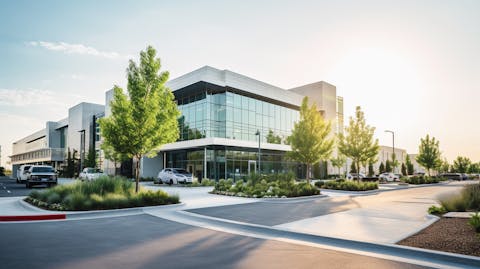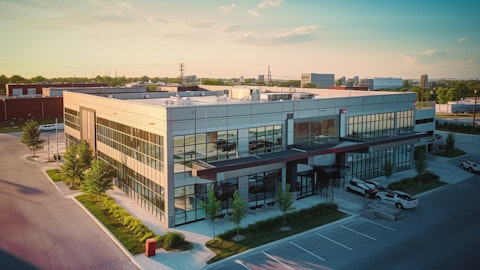Global Medical REIT Inc. (NYSE:GMRE) Q3 2024 Earnings Call Transcript November 7, 2024
Operator: Greetings, and welcome to the Global Medical REIT Third Quarter 2024 Earnings Conference Call. At this time, all participants are in a listen-only mode. A brief question-and-answer session will follow the formal presentation. [Operator Instructions]. As a reminder, this conference is being recorded. It is now my pleasure to introduce your host, Steve Swett, Investor Relations. Thank you, sir. You may begin.
Steve Swett: Thank you. Good morning, everyone, and welcome to Global Medical REIT’s third quarter 2024 earnings conference call. On the call today are Jeff Busch, Chief Executive Officer; Alfonzo Leon, Chief Investment Officer; and Bob Kiernan, Chief Financial Officer. Please note the use of forward-looking statements by the company on this conference call. Statements made on this call may include statements, which are not historical facts and are considered forward-looking. Company intends these forward-looking statements to be covered by the Safe Harbor provisions, forward-looking statements contained in the Private Securities Litigation Reform Act of 1995 and is making the statement for purpose of complying with those Safe Harbor provisions.
Furthermore, actual results may differ materially from those described in the forward-looking statements and will be affected by a variety of risks and factors that are beyond the company’s control, including, without limitation, those contained in the company’s 10-K for the year ended December 31, 2023, and its other SEC filings. Company assumes no obligation to update publicly any forward-looking statements, whether as a result of new information, future events or otherwise. Additionally, on this call, the company may refer to certain non-GAAP financial measures, such as funds from operations, adjusted funds from operations, EBITDAre and adjusted EBITDAre. You can find a tabular reconciliation of these non-GAAP financial measures to the most currently comparable GAAP numbers in the company’s earnings release and its filings with the SEC.
Additional information may be found on the Investor Relations page of the company’s website at www.globalmedicalreit.com. I would now like to turn the call over to Jeff Busch, Chief Executive Officer of Global Medical REIT. Jeff?
Jeff Busch: Thank you, Steve. Good morning, and thank you for joining our third quarter 2024 earnings call. Our high-quality diversified portfolio continues to produce strong results. At the end of the third quarter, portfolio occupancy was 96.1% with a weighted average lease term of 5.6 years and portfolio average rent coverage ratio of 4.6x. For the third quarter, net income attributable to common shareholders was $1.8 million or $0.03 per share, compared to $3.1 million or $0.05 per share in the third quarter of 2023. FFO attributable to common shareholders and non-controlling interest in the third quarter was $0.19 per share and unit down $0.03 from the prior quarter. AFFO attributable to common shareholders and non-controlling interest was $0.22 per share and unit down $0.01 from the prior year quarter.
The decrease is due primarily to the impact of cash basis tenants including Steward at our Beaumont facility. Regarding our acquisition activity early this year, we announced that we had entered into a purchase agreement to acquire a 15 property portfolio of outpatient medical real estate properties for an aggregate purchase price of $80.3 million. These properties are fully leased under triple net or absolute triple net leases with a cap rate of 8%. During the third quarter, we closed on the first tranche of this acquisition consisting of five properties for $30.8 million and a subsequent to quarter end, in October, we completed the acquisition of the remaining 10 properties. Looking ahead, we currently have five property portfolio of medical outpatient facilities under contract to purchase for just under $70 million.
These properties are 94% leased to high-quality medical tenants and have a 9% cap rate. We remain optimistic about the acquisition market, with our asset class are encouraged by our recent successes in adding quality assets to our portfolio. As we continue to focus on our growth, we remain committed to staying disciplined in maintaining a strong balance sheet. In the third quarter; we issued 1.2 million shares of our common stock to our ATM at an average offering price of $9.95 per share, generating gross proceeds of $12 million. In addition, asset recycling continues to be a key element in financing our growth initiatives. During the third quarter, we closed on the sale of two medical facilities at a cap rate of 7% that generated aggregate gross proceeds of $12.1 million, resulting in an aggregate gain of $1.8 million.
We expect to continue to both issue common equity and sell assets as we move forward in order to maintain a strong balance sheet. In terms of tenant related items, in September, we announced that we entered into a new 15-year triple net lease with an affiliate of CHRISTUS Health at our healthcare facility in Beaumont, Texas replacing Steward Healthcare. We are excited to begin our new relationship with CHRISTUS and I’m pleased with our team’s ability to re-lease this property to a high-quality tenant, achieving a great outcome for shareholders. Overall, I am pleased with our third quarter results and want to thank the entire team for hard work and contributions to our results. With that, I turn the call over to Alfonzo to discuss our investment activity and current market conditions in more detail.
Alfonzo Leon: Thank you, Jeff. The transaction market for medical facilities that align with our investment criteria continues to evolve. We remain actively engaged with a diverse range of physician groups, brokers, and corporate sellers to source acquisition opportunities that will help us continue growing our portfolio. In anticipation of Fed rate cuts, volume and quality has picked up. However, the increase in mortgage rates has tempered demand in the past month. As Jeff mentioned, in July, we closed on the first tranche of our 15 property portfolio of outpatient medical real estate, acquiring five properties encompassing approximately 95,000 leasable square feet. In early October, we completed the acquisition of the remaining 10 properties encompassing approximately 160,000 leasable square feet.
In total, the shifting property portfolio had an aggregate purchase price of $80.3 million with an aggregate of approximately 254,000 leasable square feet and aggregate annualized base rent of $6.4 million equating to an ACAP. We view this transaction as reflective of current market trends where sellers are increasingly accepting higher cap rate deals in response to ongoing challenges in the refinancing market and pressure on real estate funds to sell. Looking ahead on acquisitions, as Jeff previously stated, we have a $70 million portfolio of five medical outpatient facilities under contract to purchase at a 9% cap rate. Similar to our 2024 acquisitions, we have anticipated closing on this acquisition in two tranches during the first half of 2025.

These five properties are located in three states are 94% occupied, have an aggregate of approximately 487,000 leasable square feet and an aggregate in place NOI of approximately $6.3 million. We are purchasing these properties at $143 per square feet, well below replacement cost. Most tenants in these buildings have invested significant capital in their own suite resulting in rents averaging $14 to $15 per square foot triple net. These properties have been very well maintained and are mission critical assets to the corresponding health systems. Tenancy in these buildings includes a comprehensive mix of providers offering primary care and urgent care specialists like neuro, cardio, ortho and cancer as well as diagnostics, radiology and labs.
In addition, all of these properties are subject to ground leases with an average remaining term of 60 years and approximately two-thirds of the property square footage is on campus. Approximately 60% and 82% of the on and off campus properties respectively are leased investment grade tenants. Note that our obligation to close this acquisition is subject to certain customary terms and conditions including due diligence, reviews and tenant interviews. Accordingly, there is no assurance that we will close this acquisition on a timely basis or at all. On a dispositions front, pursuant to our normal capital recycling process, during the quarter, we closed on the sale of a medical facility in Panama City, Florida, receiving gross proceeds of $11 million, resulting in a gain of $1.7 million.
Later in the quarter, we also sold another medical facility located in Panama City Beach, Florida, receiving gross proceeds of $1.1 million, resulting in a gain of $100,000. In total, the cap rate on these dispositions was 7%. As always, we remain committed to a disciplined approach to investments that align with our strategy and disciplined underwriting standards. By leveraging our competitive advantages, our scale, access to capital, and the potential use of OP unit deal structures, we intend to unlock opportunities and drive value. I’d now like to turn the call over to Bob to discuss our financial results. Bob?
Bob Kiernan: Thank you, Alfonzo. At the end of the third quarter 2024, our portfolio consisted of gross investments in real estate of $1.4 billion and included 4.8 million of total leasable square feet, 96.1% occupancy, 5.6 years of weighted average lease term, 4.6x rent coverage with 2.2% weighted average contractual rent escalations. In the third quarter of 2024, our total revenues decreased by approximately 3.5%, compared to the prior year quarter to $34.3 million due primarily to changes in our portfolio including lower occupancy in 2024, compared to 2023 and the impact of tenants being placed on cash basis accounting subsequent to the end of the third quarter of 2023. Total expenses for the third quarter of 2024 were $32.7 million, compared to $33 million in the prior year quarter.
The decrease is due to reduced depreciation and amortization expenses primarily related to disposition transactions that were completed during 2024, partially offset by increased operating expenses and interest expense. Our operating expenses for the third quarter of 2024 were $7.4 million, compared to $7.2 million in the prior year quarter. Regarding the third quarter 2024 expenses, $4.8 million related to net leases where the company recognized a comparable amount of expense recovery revenue and $1.6 million related to gross leases. Relative to the increase in expense in 2024, this reflects increased costs from properties acquired in 2024 as well as the impact of tenants placed on cash basis accounting subsequent to the end of the third quarter of 2023, partially offset by a net reduction in costs at other properties.
G&A expenses were $4.4 million in both the third quarter of 2024 and the prior year quarter. We continue to expect our quarterly G&A expenses to be in the range of $4.4 million and $4.6 million. In the third quarter of 2024, we completed two dispositions that generated aggregate gross proceeds of $12.1 million, resulting in an aggregate gain of $1.8 million. In the third quarter of 2023, we completed one disposition receiving gross proceeds of $10.1 million, resulting in a gain of $2.3 million. Net income attributable to common stockholders for the third quarter of 2024 was $1.8 million, or $0.03 per share, compared to $3.1 million or $0.05 per share in the third quarter of 2023. FFO attributable to common stockholders and non-controlling interest in the third quarter of 2024 was $13.7 million, or $0.19 per share in unit, compared to $15.3 million or $0.22 per share in unit in the third quarter of 2023.
AFFO attributable to common stockholders and non-controlling interest in the third quarter of 2024 was $15.3 million, or $0.22 per share in unit, compared to $16.5 million or $0.23 per share in unit in the third quarter of 2023. Moving on to the balance sheet, as of September 30, 2024, our gross investment in real estate was $1.4 billion. At September 30, 2024, we had $634 million of total gross debt with a weighted average remaining term of 2.2 years. At quarter end, 81% of our total debt was fixed rate debt. Our leverage ratio was 44.1% and our weighted average interest rate was 3.79%. Lastly, as of today, the current unutilized borrowing capacity under the credit facility is $221 million. Relative to equity, in the third quarter, we generated gross proceeds of $12 million through ATM issuances of 1.2 million shares of common stock at an average price of $9.95 per share.
As we consider funding options for the acquisitions that we have closed or expected to close next year, we will continue to be disciplined and consider both potential asset dispositions and equity issuances as we seek to maintain leverage in our target range of 40% to 45%. With respect to our investment portfolio and our 2024 lease expirations, we are pleased with our progress on renewals and based on activity to-date, we are currently trending towards an 85% retention rate on this year’s expiring leasable square feet. Regarding capital expenditures on the portfolio, during the third quarter, our cash spend was approximately $4.8 million. Year-to-date through September 30, our cash outflows for capital expenditures were approximately $10 million, with approximately 42% of that related to tenant improvements.
For the full year 2024, we’re projecting total capital expenditures of $12 million to $14 million. As previously mentioned, earlier in the year, we discussed Steward Healthcare’s bankruptcy announcement and their exposure in the company’s portfolio. At the time of the bankruptcy announcement, Steward represented 2.8% or $3.1 million of the company’s annualized base rent, of which 86% related to our facility located in Beaumont, Texas. Post-bankruptcy, the company received base rent payments on its lease at the Beaumont facility for the months of June, July and August. During the quarter, Steward rejected our lease at the Beaumont facility and we entered into a new 15-year triple net lease with an affiliate of CHRISTUS Health at this property.
We are pleased to have secured a long-term lease with CHRISTUS affirming the quality of this property and we expect rent to commence on this lease in March or April 2025. In conclusion, we continue to believe that we are well-positioned to execute on our acquisition and overall business strategy and look forward to sharing our progress in the quarters to come. This concludes our prepared remarks. Operator, please open the call for questions.
Operator: Thank you. We will now be conducting a question-and-answer session. [Operator Instructions]. Thank you. Our first question comes from the line of Austin Wurschmidt with KeyBanc. Please proceed with your question.
Q&A Session
Follow Chiron Real Estate Inc. (NYSE:XRN)
Follow Chiron Real Estate Inc. (NYSE:XRN)
Receive real-time insider trading and news alerts
Austin Wurschmidt: Great. Thank you, and good morning. Jeff or Bob, you both kind of referenced that you’re committed to maintaining a strong balance sheet. I guess, when you look at the options available, you mentioned equity and dispositions. Which do you view as kind of more attractive source today? And can you just remind us how much you have left the fund to sustain your leverage target?
Jeff Busch: Yes. Bob?
Bob Kiernan: Yes. Thanks, Austin. Good morning. So right now, we ended the quarter at leverage of 44%. If we don’t do sell any assets or raise equity in the fourth quarter, we would end the year at 46%. So we would be just outside the range that we’ve talked about and we’re not uncomfortable going above the range. Ideally, we want to stay in our range, but from the 46%, I mean coming back down into the target range doesn’t require a lot of asset sales or equity issuances to bring it down. And so we have potential sales opportunities. But again there’s lead time that’s involved in sales. And so we were always looking at the portfolio and considering potential just normal capital recycling disposition activity. And so those are the things we look at. And again if equity markets are there, we would tap into those as well. But we’re not far outside our range would be the main point I’d make.
Austin Wurschmidt: Are there any assets you’re marketing today? And I guess, with the move higher in long-term interest rates, has there been any change in sort of level of interest from buyers or the cap rates that are being negotiated versus a few months ago?
Bob Kiernan: If there’s assets that we’re considering and there’s — Alfonzo, you can speak to the pressure on pricing, but yes, there’s definitely been — the market is evolving — always evolving.
Alfonzo Leon: Yes. And I’d say in expectation of the Fed rate cuts, there was increased optimism in the market and pricing that was beginning to increase and cap rates beginning to decrease. But in the last month in October, with debt rates on mortgages going up that has subdued the interest. And so there’s mixed messages right now and it’s not settled. Previously I thought that maybe year ended, the pretty meaningful pickup in volume as a result of the Fed rate cuts, but I’m beginning to think question there is, how much that’s going to materialize.
Austin Wurschmidt: So I guess, given kind of you’re optimistic about the acquisition market today but still have some funding to do, I guess, how comfortable are you moving forward with any additional deals prior to funding what you’ve announced heretofore?
Alfonzo Leon: I mean, we take it step by step. So we’re focused on this next acquisition and are routinely observing kind of where we are and looking at our portfolio, as Bob said, for things that we can sell in the market and looking for assets that either we think can achieve optimal pricing in the current market or just assets that we feel long-term are not ones we want to continue owning and want to just recycle capital. But it’s something that we evaluate almost on a weekly basis.
Austin Wurschmidt: Thank you. Appreciate the time.
Operator: Our next question comes from line to Bryan Maher with B. Riley. Please proceed with your question.
Bryan Maher: Great. Thank you, and good morning. Thanks for all that color on the new set of assets that you’re acquiring. I don’t think that you gave us the states, though. Can you give us kind of where in the country you’re buying these?
Alfonzo Leon: Yes. So given the fact that we just put these under contract and we’re working due diligence, I mean, we’ve opted to not mention the states, really for confidentiality purposes, but as we move forward, I mean, yes, of course, we’re going to provide more color and more detail around the transaction, but at this point, we wanted to be more confidential.
Bryan Maher: Okay. Maybe following on Austin’s questioning on equity, you’ve talked about this in the past a little bit about the ability to do accretive transactions even with your stock kind of here in the nines. But should we think about it, that you’re going to issue high-nines, tens on these new deals or at what level is it accretive to do this second transaction that’s forthcoming to raise equity?
Bob Kiernan: Yes. At nine cap asset purchases, and again, depending on where the debt side of the forward curve is and debt side of the cost of capital, when we look at that, we can be accretive anywhere from, say, 9.50% and above when you look at those purchases.
Bryan Maher: Okay. And then on the disposition side, what’s kind of driving the selectivity of the assets that you sell? Is it just — there’s slower growers? Are there known vacates coming? I mean, what’s driving that side of the equation?
Alfonzo Leon: I mean, it’s a variety of things. I mean, the ones you mentioned, I mean, also properties that we feel can get optimal pricing. So it kind of covers the full spectrum, but yes, I mean, properties that are just given our current company and where we want to go forward, properties that are just too small or locations that are just not ideal, but also properties that we feel have renewals that are not as high as we would want. And so we’re getting ahead of those expirations with and trying to sell these things with term on them.
Bryan Maher: Okay. And then just last from me, and correct me if I’m wrong, you talked a little bit about Steward and Beaumont and that you had collected rents for, I guess, June, July, August, or July, August, September. Did you guys somehow feel like you didn’t collect March, April, May? Am I thinking about that right? And has that since changed?
Alfonzo Leon: You think that right.
Bob Kiernan: That’s right, Bryan. We did not collect for March, April and up to that point in bankruptcy. And so we did collect the month subsequent to bankruptcy, but we still have a claim in pursuant to the bankruptcy. We would — we do have a claim in bankruptcy court to collect any rent and other expenses that are due during the period post-bankruptcy up until the point where they rejected the lease. So that’s something that we’re actively working on and would be pursuing with the court.
Bryan Maher: Okay. Thank you. That’s all for me.
Operator: Our next question comes from the line of Rob Stevenson with Janney. Please proceed with your question.
Rob Stevenson: Good morning, guys. Can you talk about where the CHRISTUS rent is versus Steward and do you have CHRISTUS elsewhere in the portfolio today?
Bob Kiernan: The CHRISTUS rent, the annual rent for the new lease is $2.9 million and it’s slightly above the previous rent Steward was paying. They were right around $2.8 million.
Rob Stevenson: Okay. And is this going to be your only location at present with them when this is — when this lease starts?
Alfonzo Leon: Yes, I’m pretty sure. I mean, there might be a small lease, but to my knowledge, I mean, nothing material, this would be a new relationship.
Rob Stevenson: Okay. So your exposure then will be less than 3% in terms of tenant as percentage of ABR.
Alfonzo Leon: Yes.
Rob Stevenson: And then I guess, do you have any CapEx on this asset prior to them moving in that you’ll have to complete?
Bob Kiernan: Yes, Rob. So part of the process of just getting the asset in the condition for CHRISTUS and getting it all situated, it involved a fair amount of CapEx. We’ve been spending upwards of probably before it’s all said and done, close to $900,000 in CapEx specific to the property. A lot of that it will be cost that we will claim in the bankruptcy corps, as a claim against Steward for things that should have been or been maintained as part of the lease. And so these are mainly infrastructure type items and some of them have lead times in terms of getting the equipment, installing the equipment, things of that nature. And so it’s — there’s definitely a process involved in just delivering that asset.
Rob Stevenson: Okay. And then, on the $70 million portfolio acquisition is there a specific reason why the closing is further out and into tranches? Is that just to allow you guys to finance it? Is it something on the seller’s part? Is there something that needs to happen before you can close? Can you just talk about that?
Jeff Busch: Yes. So, I mean, a variety of things, but preliminarily it’s just flexibility, and actually with our experience on the most recent transaction, when we staged, when we did it in a couple tranches, it resulted in some efficiencies as well. And so if we can do it again, it’s something that we want to do on this transaction as well. But I mean, it’s flexibility that can go either way. And if we changed our minds later on and we want to do it all at once, that’s something that we consider. But having said that, I mean, there’s also diligence items that we have to dig into, and it just made more sense to spread it out over a couple of tranches.
Rob Stevenson: Okay. And is there any significant tenant concentration in that portfolio that’s going to push into your top 10 post-deal?
Jeff Busch: Yes. Yes, there is. And so the biggest change would be Trinity, so that one would bump up from number 10 to potentially number three.
Rob Stevenson: Okay, that’s helpful. Thanks, guys. Appreciate the time this morning.
Jeff Busch: Thank you.
Operator: Our next question comes from line of Alec Feygin with Baird. Please proceed with your question.
Alec Feygin: Hi, thanks for taking my question. First one is what is the plan to fund the portfolio deal and future acquisition opportunities? Is it just the dispositions and equity, or are you going to potentially raise debt as well?
Jeff Busch: Right now, the plan to do dispositions and equity, we raised a little bit of equity, $12 million in the last quarter, and we do have some sales already in process. So we’re realigning our acquisitions. We’re taking a look at some of our assets that, that are not performing as well, and we’ve been able to sell them at pretty attractive prices. So we’re looking more towards equity and dispositions than debt. But we may go — it may go slightly and temporarily above on the debt that we target.
Alec Feygin: And how much more runway does GMRE have with its asset recycling program? Is this something you can do for quarters on end years?
Jeff Busch: It’s probably not going to be a permanent solution. The market tends to adjust. So for instance, we — the market tends to adjust. We’ve been buying, as you notice, our average buying is somewhere in the mid-8s right now. So for instance, if the rates do not come down, the market always adjusts because groups have to sell. So we will be buying higher cap rates. And which means that we could go to equity also.
Alec Feygin: And are you planning to issue a term loan to reduce the line balance anytime soon?
Bob Kiernan: Not currently, that’s something we’ll look at probably in the first half of next year.
Alec Feygin: Thanks, guys. That’s it for me.
Jeff Busch: Thank you.
Operator: Our next question comes from line of Juan Sanabria with BMO Capital Markets. Please proceed with your question.
Robin Haneland: Good morning. This is Robin Haneland sitting in for Juan. Not sure if this was touched on already, but on CHRISTUS, how much, if any, did rents decline in the Beaumont assets under the transition and should we model any other modest sequential declines in the non-Beaumont assets post the Steward bankruptcy?
Bob Kiernan: The rent of the Beaumont facility. Yes…
Jeff Busch: Yes, go ahead, Bob.
Bob Kiernan: Well, the rent at the Beaumont facility is just marginally higher than the previous Steward — Steward rents at $2.9 million of annual rent. And we talked about that cash rent starting in March or April of next year as our current outlook. And so that, that asset again is kind of net above the other Steward leases have not been rejected with the exception of one very small lease in the multitenant building that we have in Hialeah, Florida. This — that the lease was projected in at the end of October. And it’s a very — again, it’s a very small lease; it’s under 4,000 square feet of space, so not anything noteworthy from an overall perspective.
Robin Haneland: Okay. And your dividend payout ratio inclusive of CapEx is north of 100% of FAD. How does the board and management think about dividend sustainability in particular with leverage generally elevated?
Jeff Busch: Yes. Right now, we could maintain our dividend and we’re looking in the future that we can maintain our dividend. We do see accretive deals coming through. So we get — and we get the rent increases regularly. We had a very big two years of re-leasing. It’s an unusual amount of re-leasing in the last two years, which causes a bit more capital, a bit more TI type of thing. So we do see that TI in capital starting to reduce. Given proportionally, we don’t have so many re-leases coming up. So we do look like to maintain our dividend.
Robin Haneland: Okay. And this has been combed over quite a bit. But is there a dollar sized of the pool of assets that are targeted for future disposition? Is there…
Bob Kiernan: It’s a fluid — it’s a fluid number. It’s not a targeted number. It’s something we look at all the time in assessing potential sales opportunities. And sometimes they’re inbound inquiries about assets that people want to purchase that we are dealing with as well. So I think it’s not a set number. It’s just, I think of it more as a fluid situation.
Jeff Busch: Yes. Now that we’ve had a few, LOIs that have come in on assets that were attractively priced, which forced us to reconsider whether we wanted to sell it or not and a couple of those we move forward on.
Robin Haneland: Got it. Makes sense. And just curious, on your lease expiration exposure for 2025, it just increased a little bit. Could you maybe just elaborate on that?
Bob Kiernan: I think it would have increased — it could be from again from assets that we’ve acquired that, that would have impacted the number, but from an outlook on our 2025 expirations, I mean we’re currently again looking at this very similar to how our experience was in this year in calendar 2024 relative to re-leasing. So I think we’re optimistic about our occupancy and leasing activity looking ahead into 2025.
Robin Haneland: Okay. And last one for me, the pipeline, how big is it today? What assets are you looking at and what types of yields should investors expect? Is this 9% a good run rate going forward?
Jeff Busch: Yes. So I mean the market is continually evolving and what we’re focused on primarily is medical office and that’s typically where the bulk of the volume is in the market anyways. But cap rates that in the market for the type of assets that we’re looking at, they’re more in the high-7s to mid-8s range, depending also on whether it’s single tenant or multi-tenant. And so they’re not that many opportunities that are nine and above. But we’re always looking for unique situations and they do occur. And there’s a couple opportunities that I’ve heard of that might be coming down the road where you are getting into that high-8s, low-7s range, but the bulk of the market is in the high-7s to mid-8s.
Robin Haneland: Thank you.
Operator: Our next question comes from the line of Gaurav Mehta with Alliance Global Partners. Please proceed with your question.
Gaurav Mehta: Yes, thank you. Good morning. I wanted to ask…
Jeff Busch: Good morning.
Gaurav Mehta: I wanted to ask you on the portfolio acquisition that you have under contract and your comments about market cap rate in high-7 to mid-8, what was specific about this portfolio that drove the cap rate to 9%, which is higher than where the market is?
Jeff Busch: A variety of factors, but I mean one of the things that drives cap rates, a big one is properties that are attractive to funds that have short life spans five-year hold periods, what they’re looking for are properties that are ideal for flipping, for putting within a portfolio and getting a premium on the exit. And given the fact that these properties are on campus. And just given the profile of the properties and its location, I mean, it’s not ideal for that kind of strategy. And so you’re getting extra yield for that reason. But the other one too is this was a relationship deal, one that the parties involved; we have connections with that that span many, many years. And there was a process that, that they employed to find somebody to partner with for this. And I think that contributed as well to some of the yield.
Gaurav Mehta: Okay. Thank you. That’s all I had.
Operator: Thank you. We have reached the end of the question-and-answer session. I would now like to turn the floor back over to management for closing comments.
Jeff Busch: Thank you, everybody. I think we had a good quarter. We’ve acquired nice properties with good rates, and we have good contracts on future properties. And thank you very much for attending.
Operator: Ladies and gentlemen, this does conclude today’s teleconference. You may disconnect your lines at this time. Thank you for your participation and have a wonderful day.
Follow Chiron Real Estate Inc. (NYSE:XRN)
Follow Chiron Real Estate Inc. (NYSE:XRN)
Receive real-time insider trading and news alerts





